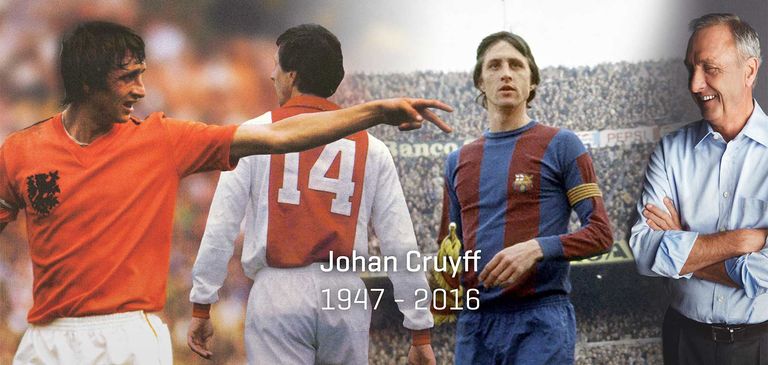
Hendrik Johannes Cruijff , known internationally as Johan Cruyff is a former Dutch footballer, coach of the Catalan national team, former honorary president of FC Barcelona and collaborator of the Catalan federation in sports and social projects. His surname is spelled Cruyff in the traditional spelling or Cruijff in the reformed Dutch spelling.
Hendrik Johannes Cruijff was born on April 25, 1947, at 1 p.m., in Linnaeusstraat, and grew up in a suburb of Amsterdam, half a kilometer from the Ajax stadium. He was the son of Hermanus Cornelius Cruijff, owner of a fruit and vegetable store, and Petronella Bernarda Draaijer, who helped in the store and at home.
He played ten seasons in the first team of Ajax Amsterdam, signing in 1973 for FC Barcelona, from which he left in 1978 to join the American Soccer League. He spent three seasons there, interspersed with a season with Levante UD, which played in Spain's Second Division, before finally returning to the Dutch league in 1981, playing two seasons with Ajax and his last as a player with Feyenoord Rotterdam.
He received the Ballon d'Or on three occasions (1971, 1973 and 1974), a record he shares with Michel Platini and Marco Van Basten. Cruyff was the most famous exponent of the soccer philosophy known as “Total Football”, developed by Rinus Michels. In 1984, after retiring from playing football as a player, Cruyff became coach of Ajax and later coach of FC Barcelona, clubs for which he remains an influential advisor.
He is considered by FIFA to be one of the four greatest footballers of the 20th century, along with Pelé, Diego Armando Maradona and Alfredo Di Stéfano, and the best in Europe. He was also voted second best player of the 20th century by the IFFHS6 and in 1999 as Player of the Century by all Ballon d'Or winners to date.
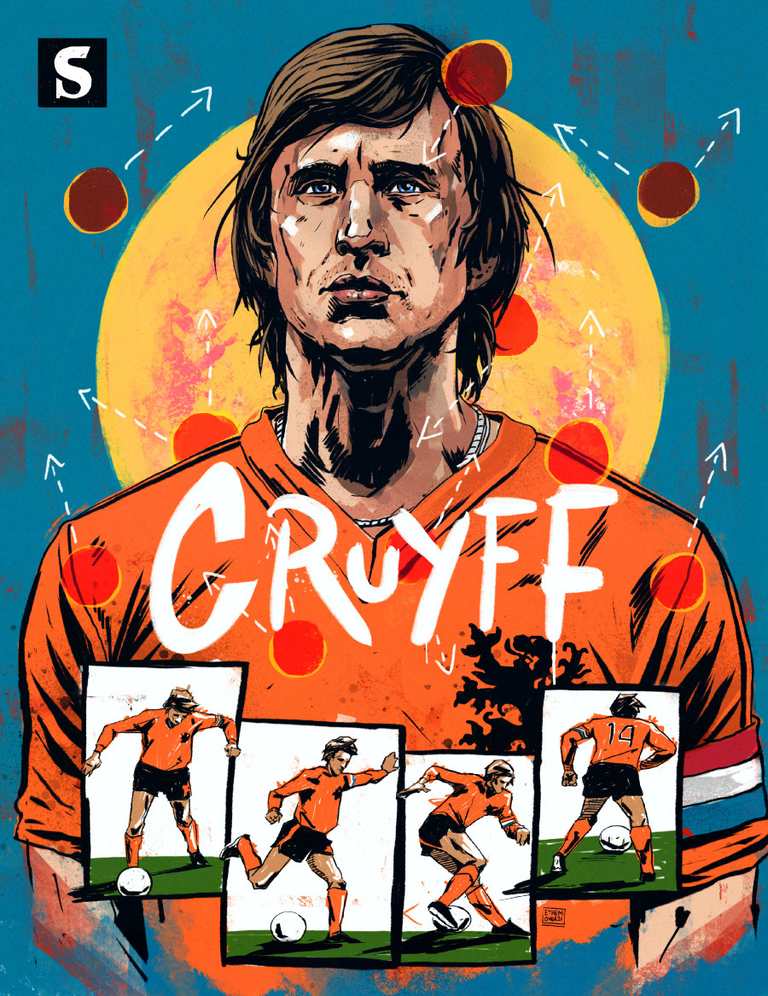
It is difficult to assign a precise tactical role to Cruyff. In his Ajax team, and later in the Dutch national team that was runner-up at the 1974 World Cup, he played almost as a deep center forward, what today is called a “false newcomer”. He would start from his trocar to aim for the net with quick triangulations or direct percussions, often unstoppable. He was the first great ace of modern soccer, the first to combine style and speed, talent and ultra-fast execution. Qualities enhanced by the total soccer of Rinus Michels at Ajax and then in the national team.
A team, that Holland, destined to change the history of soccer. The eleven players on the field took part in the choral maneuver, without too many role distinctions. The full-backs and supporting midfielders became irresistible attackers and the wingers went to retrieve the ball on the threshold of their own defense.
In addition, they played with a zonal defense, saving efforts in favor of a collective maneuver that rewarded them with constant ball possession. Even Guardiola's Barcelona, with its tiki taka, is indebted to that Holland, which changed the philosophy of the game.
A chain-smoker, a wild nursery in his golden years, Cruyff embodied the Dutch model well even off the pitch. The retreats with wives and partners in tow, the nights of love before important matches, the hippie-inspired vocation for soccer.
That was Johan Cruyff, an infinite talent, a footballer born to leave his historical mark on the most beautiful sport in the world.
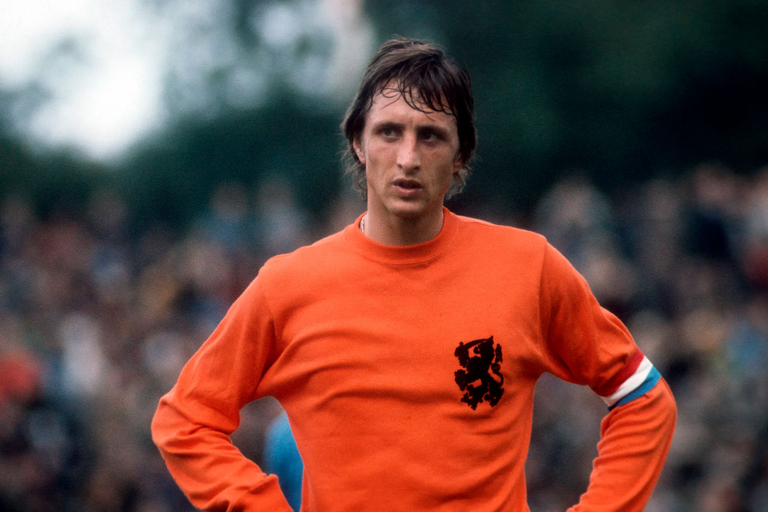

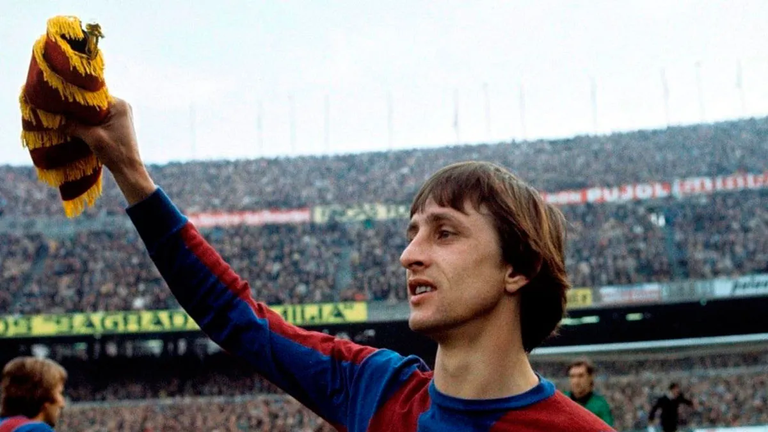
Hendrik Johannes Cruijff , conocido internacionalmente como Johan Cruyff es un exfutbolista holandés, entrenador de la selección catalana, expresidente de honor del FC Barcelona y colaborador de la federación catalana en proyectos deportivos y sociales. Su apellido se escribe Cruyff en la ortografía tradicional o Cruijff en la ortografía holandesa reformada.
Hendrik Johannes Cruijff nació el 25 de abril de 1947, a las 13.00 horas, en Linnaeusstraat, y creció en un barrio de las afueras de Ámsterdam, a medio kilómetro del campo del Ajax. Era hijo de Hermanus Cornelius Cruijff, dueño de una tienda de frutas y verduras, y de Petronella Bernarda Draaijer, que ayudaba en la tienda y en casa.
Jugó diez temporadas en el primer equipo del Ajax Amsterdam, fichando en 1973 por el FC Barcelona, del que abandonaría en 1978 para incorporarse a la American Soccer League. Allí estuvo tres temporadas, intercaladas con una temporada en el Levante UD que jugó en la Segunda División de España, para finalmente regresar en 1981 a la liga holandesa, jugando dos temporadas en el Ajax y su última como jugador en el Feyenoord Rotterdam.
Recibió el Balón de Oro en tres ocasiones (1971, 1973 y 1974), marca que comparte con Michel Platini y Marco Van Basten. Cruyff fue el exponente más famoso de la filosofía futbolística conocida como “Fútbol Total”, desarrollada por Rinus Michels. En 1984, tras retirarse de los terrenos de juego como jugador, Cruyff se convirtió en entrenador del Ajax y posteriormente entrenador del FC Barcelona, clubes de los que sigue siendo un influyente asesor.
Está considerado por la FIFA como uno de los cuatro mejores futbolistas del siglo XX, junto con Pelé, Diego Armando Maradona y Alfredo Di Stéfano, y el mejor de Europa. También fue elegido segundo mejor jugador del siglo XX por la IFFHS6 y en 1999 como Mejor Jugador del Siglo por todos los ganadores del Balón de Oro hasta la fecha.
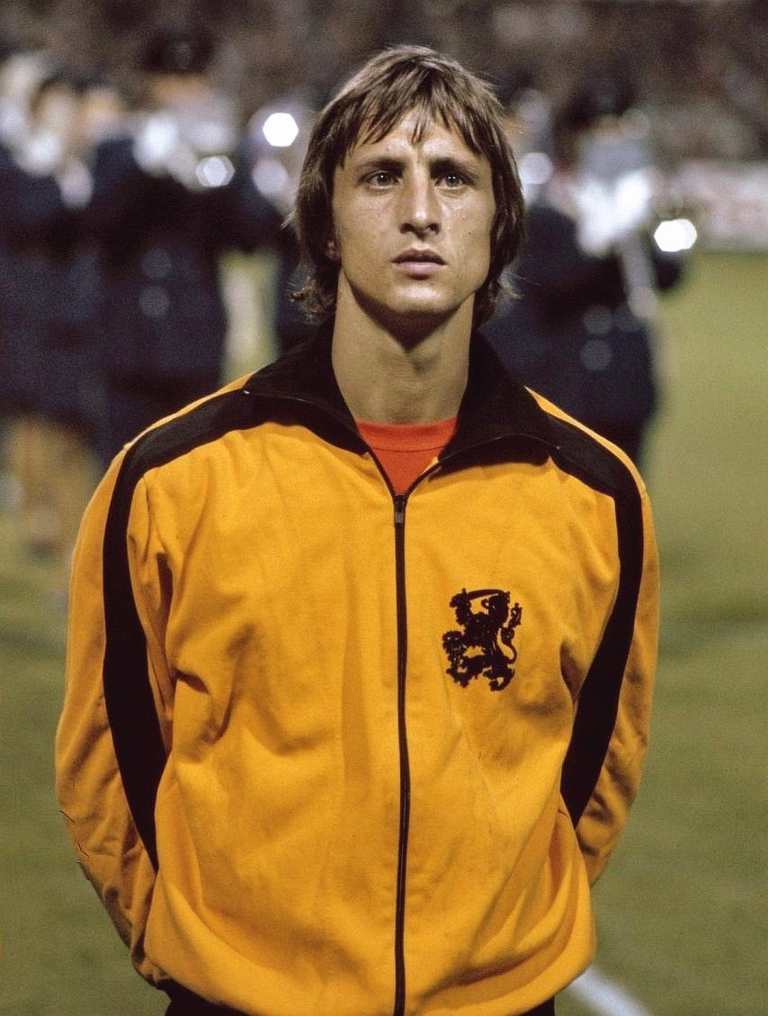
Es difícil asignarle un papel táctico preciso a Cruyff. En su equipo Ajax, y luego en la selección holandesa que fue subcampeona del mundo en 1974, actuó casi como un delantero centro profundo, lo que hoy se llama "falso nuevo". Partía de su trocar para apuntar a la red con rápidas triangulaciones o percusiones directas, muchas veces imparables. Fue el primer gran as del fútbol moderno, el primero en combinar estilo y velocidad, talento y ejecución ultrarrápida. Cualidades potenciadas por el fútbol total de Rinus Michels en el Ajax y luego en la selección nacional.
Una selección, aquella Holanda, destinada a cambiar la historia del fútbol. Los once presentes en el campo participaron en la maniobra coral, sin demasiadas distinciones de roles. Los laterales y centrocampistas de apoyo se convirtieron en atacantes irresistibles y los extremos fueron a recuperar el balón en el umbral de su propia defensa.
Además, jugaron con una defensa zonal, salvando esfuerzos a favor de una maniobra colectiva que les premió con una posesión constante del balón. Incluso el Barcelona de Guardiola, con su tiki taka, está en deuda con aquella Holanda, que cambió la filosofía del juego.
Un fumador empedernido, un vivero salvaje en sus años dorados, Cruyff encarnó bien el modelo holandés incluso fuera de la cancha. Los retiros con esposas y compañeros a cuestas, las noches de amor previas a partidos importantes, la vocación por el fútbol de inspiración hippie.
Así era Johan Cruyff, un talento infinito, un futbolista nacido para dejar su huella histórica en el deporte más bonito del mundo.

Source images / Fuente imágenes: Johan Cruyff.


Sources consulted (my property) for the preparation of this article. Some paragraphs may be reproduced textually.
Fuentes consultadas (de mi propiedad) para la elaboración del presente artículo. Algunos párrafos pueden estar reproducidos textualmente.
| Argentina Discovery. |  |
|---|---|
| Galería Fotográfica de Argentina. |  |
| Viaggio in Argentina. |  |

Telegram and Whatsapp
Thank you for supporting my content @blurtconnect-ng.
Upvoted. Thank You for sending some of your rewards to @null. Get more BLURT:
@ mariuszkarowski/how-to-get-automatic-upvote-from-my-accounts@ blurtbooster/blurt-booster-introduction-rules-and-guidelines-1699999662965@ nalexadre/blurt-nexus-creating-an-affiliate-account-1700008765859@ kryptodenno - win BLURT POWER delegationNote: This bot will not vote on AI-generated content
Thanks!